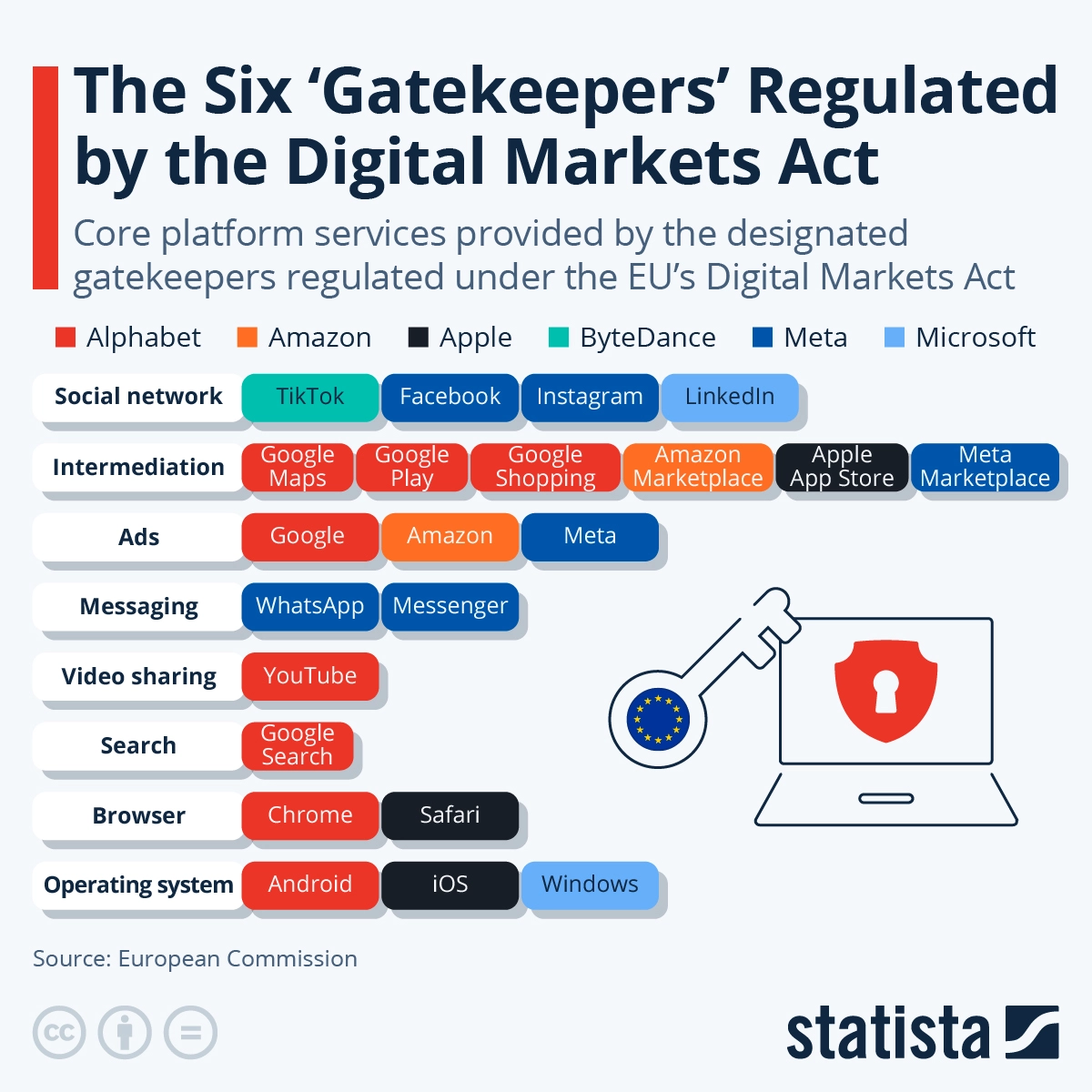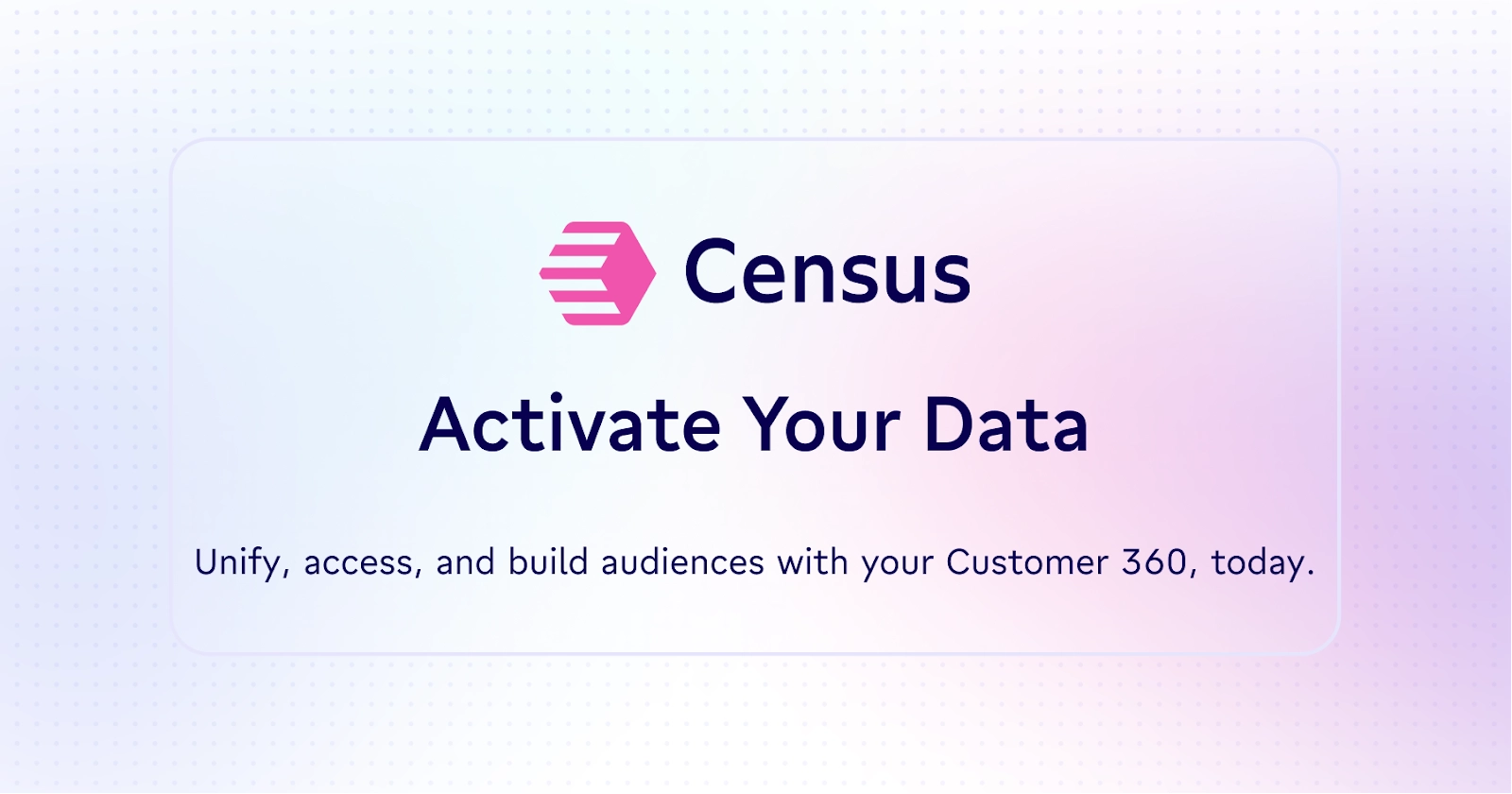If there’s one thing you can always count on in the digital marketing space, it’s that things are always changing. This is definitely true with the EU’s new law: the Digital Markets Act (DMA).
Now, the primary goal of the DMA is to create a fair online environment for all. To do this, the law works to limit the power of tech giants in the digital marketing space.
What does this mean for marketers? Well, you can expect big changes in how you reach audiences, leverage data, and approach strategic campaigns.
Though the full implications remain uncertain, one thing is clear: the DMA promises to disrupt the status quo and open up fresh opportunities for innovative, competitive marketing.
Read on to find out what Europe's Digital Markets Act (DMA) is all about and its ripple effects on digital marketers today.
Key Takeaways
- To create a fairer digital marketplace, the DMA regulates “gatekeepers” (i.e., major internet companies) and outlines strict rules to keep their dominance in check.
- For marketers, the DMA is a breath of fresh air because it provides a fair business environment where smaller players can compete on equal footing with larger counterparts.
- Non-compliance with the DMA will be met with harsh penalties, including fines of up to 20% of a company’s total global turnover.
What is the Digital Markets Act (DMA)?
The Digital Markets Act (DMA) is a European law created to foster a fairer, more competitive digital marketplace. After its proposal in December 2020, the law entered into force on November 1, 2022, and became effective on May 2, 2023.
The DMA targets "gatekeepers"—large online platforms like search engines, social networks, and online marketplaces. Its mission? To rein in the power of big tech giants and level the playing field for marketing activities.
For instance, let’s say you're running a small bakery selling cupcakes, and the only way customers can find you is through a global chain that charges an excessive fee.
Or perhaps the global chain has its own cupcake service and promotes its brand over yours. That's the kind of situation the DMA aims to fix by creating a fairer EU digital marketplace.
So, who are these gatekeepers? The European Commission has currently designated six gatekeepers (Alphabet, Amazon, Apple, ByteDance, Meta, Microsoft) spread across 22 major services, as shown in this helpful chart from Statista:

Importantly, the DMA also benefits consumers. They get more choices, better services, and more control over their data. They also enjoy more hands-on data protection on major internet spaces like social media networks and online shopping marketplaces.
What Implications Does the Digital Markets Act Have on Marketers?
The DMA is set to shake up the digital marketing landscape. It specifically intends to usher in a new era of competition, transparency, and fairness.
Here's how the law empowers your marketing strategies across several key areas:
Expand Your Reach with App Distribution Freedom
The DMA unlocks previously closed ecosystems, giving you the freedom to distribute your apps like never before. This is great news for EU app developers.
If you find it difficult to get your app in front of users because of a gatekeeper, you’ll be delighted to know that things are changing for the better. Thanks to the DMA, you now have the freedom to:
- Create Your Own App Store: The DMA allows you to build and run your own app store, giving you complete control over the user experience.
- Go Multi-Store: The DMA lets you distribute your app through various app stores for greater exposure. This way, you don't put all your eggs in one basket.
- Sideload Apps with Confidence: With the DMA, users can directly download and install your app (sideloading) on designated operating systems.
This newfound freedom paves the way for your apps to reach broader audiences and break free from the shackles of closed ecosystems.
Ensure Fair Play and Level the Playing Field
Picture this: a small e-commerce retailer hosted on a large online marketplace launches a new product. A few months later, the marketplace bursts into “innovation” and starts to offer the exact same product — perhaps even at a lower price.
If you’ve ever experienced something similar, you aren’t imagining it. BigTech platforms do this all the time. Well, no more.
Thanks to the DMA, you can now sell your products without worrying that big platforms will use your training data to launch competing products and outperform you.
In other words, your marketing data can no longer be used against you by the very gatekeepers you rely on.
Harness the Power of Effective Data Access
You’ve heard it before: Data is the lifeblood of marketing. And as a marketer, the DMA is set to put you back in the driver's seat.
You'll have access to valuable insights, including performance metrics and user behavior data, even when users interact with your services on gatekeeper platforms. This goldmine of information allows you to:
- Make Data-Driven Decisions: No more flying blind. With better access to user data, you can tailor your marketing campaigns based on real user behavior, maximizing your return on investment (ROI).
- Uncover Hidden Gems: Real-time data access unveils hidden trends and user preferences you might have missed before. This allows you to refine your marketing strategy and target your audience with laser precision.
- Ensure Smooth Data Portability: The DMA lets users authorize you to port their data, creating more seamless integration across platforms. This opens up new avenues for personalized engagement and higher user trust.
Of course, to really move the needle on this front, you need a data activation platform that empowers you to explore and harness first-party customer data. And no one does this better than Census.
Innovate with Interoperability
The DMA breaks down barriers, empowering you to offer services across designated OS like iOS, Android, and Windows. No more unfair restrictions – gatekeepers must allow interoperability free of charge.
Your marketing efforts can now extend beyond the limitations of a single platform. With interoperability, your services can reach users across different operating systems, expanding your potential customer base.
Achieve Fair Rankings and Greater Visibility
In its goals to promote fairness, the DMA will stop tech titans from promoting their own products/services over yours in search results or ads.
In the words of the Executive Vice-President of the EU Commission, Margrethe Vestager:
“The DMA will change the digital landscape profoundly. With it, the EU is taking a proactive approach to ensuring fair, transparent, and contestable digital markets. A small number of large companies hold significant market power in their hands. Gatekeepers enjoying an entrenched position in digital markets will have to show that they are competing fairly…”
The bottom line? You get a fair shot at visibility and your marketing efforts are judged based on their merits alone — not the gatekeepers’s bias.
Enjoy Fair Sales Terms and Greater Control
Thanks to the DMA, restrictive conditions that dictate your pricing practices are now a thing of the past.
Instead, you’ll have the freedom to control your pricing strategy on gatekeeper platforms based on your business goals and market dynamics.
Long story short, the DMA introduces a new reality for marketers, one filled with opportunities for healthy competition, growth, and innovation. Now for the golden question: how can you capitalize on this? Let’s see just how.
How to Adapt to The Changes Brought on by the Digital Markets Act
As we’ve established, the DMA applies to gatekeepers with operations in the European Union.
That said, its implications are likely to extend far beyond the EU — perhaps even shaking up the entire world.
To thrive in the new reality created by the DMA, keep the following in mind:
Stay Informed and Proactive
The DMA is the first law of its kind. As a result, the full extent of its implications remains uncertain. This means we’ll likely see fresh updates and new insights as things unfold.
For marketers, it’s important to keep your ear to the ground to anticipate changes and adjust your strategies accordingly.
On that note, if you're close to being a gatekeeper but not quite there yet, consider implementing DMA-friendly practices now. It'll make life easier once you hit the big leagues later.
Leverage Data Effectively
Data is your new best friend. With gatekeepers no longer able to hoard insights, you can now access a treasure trove of user behavior data and performance metrics.
This presents an opportunity to supercharge your decision-making and personalization efforts for maximum impact.
Optimize for Organic Growth
Fairness in the digital market means it's time to double down on your organic growth. How? Polish your SEO, beef up your content quality, and support your marketing efforts with best-in-class software to enjoy the rewards of a level playing field.
Think Globally
While the DMA currently impacts those operating in the EU, it could inspire similar regulations worldwide, much like GDPR did. Plus, it could be the blueprint other regions use to develop their own laws.
The point is: staying informed and proactive gives you a significant leg up — no matter where the winds of digital change blow.
How is the Digital Markets Act Enforced?
Enforcement of the DMA rests exclusively in the hands of the European Commission. Accordingly, the Commission wields full authority to:
- Identify Gatekeepers: Determine which entities qualify as gatekeepers under the law.
- Update Obligations: Dynamically adjust the obligations for gatekeepers as necessary.
- Design Remedies: Implement solutions to address systematic violations of the DMA.
Non-compliance with the DMA will not be taken lightly. According to Thierry Breton, the EU Commissioner for Internal Market:
“…It is time for gatekeepers to be designated and to comply with the rules. The Commission is already actively engaging with potential gatekeepers to ensure that compliance with the new rules starts from day one. We will also not shy away from using our enforcement powers should there be indications that obligations and prohibitions are not respected.”
What are the Penalties for Non-compliance with the Digital Markets Act?
The European Commission will not be pulling any punches when it comes to penalties. First-time offenders face fines of up to 10% of their total global turnover while repeat offenders face up to 20%.
Violators may also be subject to a periodic penalty of up to 5% of their average daily turnover. For those who systematically violate the DMA, the Commission can impose other remedies, including:
- Behavioral Remedies: Changes in the business’s practices to comply with the law.
- Structural Remedies: Organizational changes to eliminate anti-competitive practices.
- Disbandment: As a last resort, the violating business may be forced to close down.
Frequently Asked Questions
How does the Digital Markets Act affect marketing?
The DMA introduces new rules to promote fair competition and curb unfair practices by large online platforms. For marketers, this means changes in data usage, ad targeting capabilities, and access to customer data across major platforms like Google and Meta.
Long story short, adapting strategies to align with the DMA's principles will be crucial for digital marketers.
What does the Digital Markets Act mean for consumers?
Consumers can expect more choice, transparency, and control over their online experiences. This means fewer monopolistic practices, better online service, and having more say in how their information is used for marketing purposes.
Who does DMA apply to?
The DMA primarily targets large online platforms that act as "gatekeepers"—basically, companies with a dominant market position that control access to users. Current gatekeepers include Alphabet, Amazon, Apple, ByteDance, Microsoft, and Meta.
While smaller businesses won’t be affected directly, the changes could create a more level playing field for all.
How Census Can Help You With All Your Customer Data Needs

The DMA works to end the monopolistic practices of tech giants. Its goal? To create a competitive EU digital ecosystem where businesses of all sizes can flourish and consumers enjoy a richer array of services.
As a marketer, the DMA opens up quite a few doors for growth. Capitalize on the new level playing field and you're well on your way to reap substantial rewards. And it all starts with data.
With Census’s Universal Data Platform, marketers can model and segment their customers without code, then activate it in any marketing or advertising tool with Reverse ETL.
Plus, with a successful track record of serving leading companies like HubSpot, Canva, Activision, and Figma, you can rest easy knowing your marketing operations are in the best hands.
Why not take it for a spin? Schedule a tour today!


















